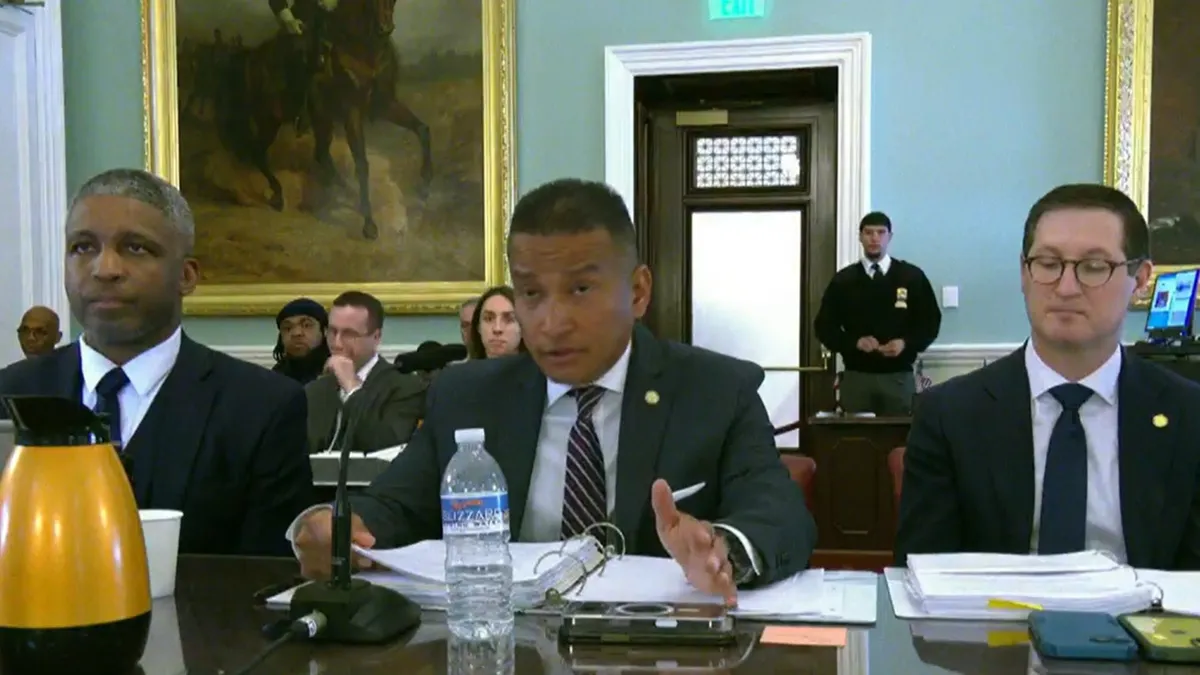The New York City Department of Sanitation will switch the borough of the Bronx to the city’s commercial waste zone system in October, marking the first expansion of the program since it was implemented in one zone in Queens last year.
The department also committed to implementing the commercial waste zone system across all 20 city zones by the end of 2027. City council members acknowledged that DSNY is making progress in implementing the system citywide, but joined outside voices in calling for a speedier timeline and hard dates for the rollout.
"We’re encouraged to see a clear commitment to full implementation, but we recognize that many advocates and stakeholders were hopeful for a faster rollout,” Council Member Shaun Abreu, chair of the Committee on Sanitation and Solid Waste Management, said in a statement following the hearing. "While this timeline is a step forward, communities are still waiting for firm dates across all zones."
Commercial haulers would be able to prepare for the change better if they had more details about DSNY's planned implementation timeline, Lew Dubuque, vice president of the Northeast region for the National Waste & Recycling Association, said during public comments Wednesday. He also called for a commercial waste zone working group in which members could share feedback about the implementation process.
"Over one year has passed and one zone has been implemented. To avoid further financial and operational burdens ... we strongly urge DSNY to share a roadmap for program implementation and elevate a partnership with awardees moving forward," Dubuque said.
The commercial waste zone system was created through the passage of Local Law 199 in 2019. It required the city to develop 20 zones with three haulers each across the five boroughs. In January 2024, the city announced 65 contracts with various haulers throughout the system, as well as five contracts for citywide container service. The new system went into effect in the first zone, Queens Central, on Jan. 3 of this year.
Waste Connections' acquisition of Royal Waste Services last year created two gaps in the system where zones had two haulers instead of three. Officials said during Wednesday’s hearing that they would begin the process of filling those gaps later this year by returning to the list of companies that initially applied for the zones through the request for proposals process.
In the two zones that cover the Bronx, businesses can begin signing up for service under the commercial waste zone system on Oct. 1. DSNY expects to fully implement the zones by Nov. 30, meaning only haulers that are allowed to operate in the zones will continue to serve the area after that time.
After that, the department expects to phase in other commercial waste zones in a staggered timeline across eight additional phases. DSNY Acting Commissioner Javier Lojan said the department would give haulers at least six months notice before it rolls out each zone so the haulers can adjust staffing or services as needed.
The department will also spend two months, rather than four, reaching out to business ahead of new zones’ implementation dates. Officials found that businesses that signed up mostly did so in the final six to eight weeks before the implementation date.
Additionally, DSNY had to assign a new hauler to the vast majority of businesses in Queens Central — about 5,500 of 8,000 total in the district — because they did not do so themselves, according to officials. Businesses were allowed to contract with a different hauler after they'd automatically been assigned one, and only about 700 did so, per DSNY.
Many of those businesses were assigned to Boro-Wide, the only one of the three haulers serving the Queens zone that was willing to take on unsubscribed customers, officials said. As a result, Boro-Wide serves about 64% of customers in Queens Central, Waste Connections serves 28% and Basin Haulage serves 8%.
DSNY Assistant Commissioner Frank Marshall said "the department did everything in its power short of actually signing the contracts on behalf of customers" through the outreach process in Queens Central.
"I don't know if this is human nature, but it appears as though it wasn't until the end of the implementation period that businesses began to sign," Marshall said.
Organics changes
Abreu related the deadline implemented in Queens Central to the evolving situation with residential curbside organics collection. DSNY began issuing fines to residential property owners that did not separate organic waste starting on April 1, only to pause fines for most situations on April 17. At Wednesday’s hearing, officials declined to commit to a date on which they would begin universally enforcing fines in the city.
Abreu said there was "a bit of an inconsistency" between the department's use of a hard deadline to enforce commercial waste zones and an unclear deadline to enforce the residential curbside organics program.
"I think your position that folks are starting to comply as close as possible to a deadline, it speaks to the power of a deadline and the power of enforcement. When you take away deadlines, it changes behavior," Abreu said.
The council member is also pushing forward a bill that would require more commercial businesses to separate their organic waste for collection. DSNY and lawmakers have agreed that policies around organics should evolve as the commercial waste zone system is implemented.
While the commercial waste zone system requires haulers to offer a discount for collection, few businesses have begun separating that materials stream. “A little under 2%” have signed up for organics collection in Queens Central since the commercial waste zone was implemented, according to Lojan.
Abreu’s bill must still pass committee before it can go to the general council. The New York City Council is also in the process of building the next budget, which must be finalized before the start of the new fiscal year on July 1.





















